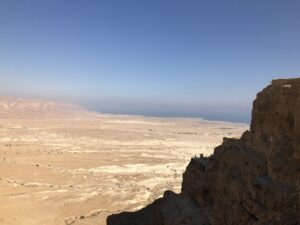
Photo by the author, Masada, Israel 2019
This d’var Torah was written for the website of the Academy for Jewish Religion (ajr.edu)
A few years ago, for Mother’s Day, my kids gave me a DNA-testing kit from Ancestry.com. Not surprisingly, the results came back as 99% Ashkenazi Jewish with 1% various other ethnicities, depending on some algorithm or something.
It was fascinating to start receiving DNA matches, including my daughter (whew!), connecting with some long-lost relatives, and learning about some distant ones whom I never knew existed. I get as far back as my great-grandparents, and then the history appears to end. My husband, whose father was part of the Egyptian Karite community, has information going back 12 or 13 generations because excellent records have been kept and kept up.
Now imagine being an Israelite born into Egyptian slavery!
The book of Bamidbar/Numbers/In the Wilderness opens by telling us that the Israelites are in their second year following the Exodus from Egypt (1:1). While we don’t yet know that they’ll spend the next 39-plus years ba midbar,“in the wilderness,” this parashah gives us the impression that the wandering group is about to settle down, at least for a while. And since they’ve already fought battles with surrounding nations, it’s assumed that more will need to be fought, and God and Moses need to know how many men over the age of 20, will be available for military service.
Chapter 1, verses 5-15, lists the names of the men who have been elected by their communities to head their respective tribes. A close reader of the text will note that the tribe of Levi is left out of that list. Fear not, they’ll show up later, but that’s a discussion for another time.
Following this list, verse 18 tells us:
וְאֵ֨ת כׇּל־הָעֵדָ֜ה הִקְהִ֗ילוּ בְּאֶחָד֙ לַחֹ֣דֶשׁ הַשֵּׁנִ֔י וַיִּתְיַֽלְד֥וּ עַל־מִשְׁפְּחֹתָ֖ם לְבֵ֣ית אֲבֹתָ֑ם בְּמִסְפַּ֣ר שֵׁמ֗וֹת מִבֶּ֨ן עֶשְׂרִ֥ים שָׁנָ֛ה וָמַ֖עְלָה לְגֻלְגְּלֹתָֽם׃
“and the entire community they assembled, on the first [day] of the second month; they declared-their-lineage according to their clans, by their Fathers’ Houses,” (Fox translation).
Let’s imagine a Talmud–style discussion of this:
The Tana Kama (early sage) says: Rashi says Yalkut Shimoni says: “They brought the records of their pedigree and witnesses to confirm the prevalent presumption regarding their parentage, so that each might establish his pedigree with regard to the particular tribe.”
Rav Bluma Sarah bat Reuven Lev ha Levi (21st c. AJR Rabbi) replied: “What could they possibly have brought? Birth certificates hadn’t yet been invented! Rather, say as Ibn Ezra does: Ya yityaldu means that ‘they were asked for their birth dates.’”
The Tana Kama argues: “But doesn’t Exodus 12:2 say ‘this month shall be the first of the months for you’ as the people were preparing to leave Egypt? An enslaved people doesn’t have control over their time; a free people does.” In other words, could they really have known when they were born? One day was like the next.
Quoting Hizkuni, Rav Bluma Sarah says, “Davar acher (another interpretation): ‘they asked their parents for details of when they had been born in order to determine if they had been 20 years old at the time of the Exodus.’ A mother doesn’t forget giving birth.”
Tayku, says the stam, the anonymous voice of the Talmud, “let it stand.” There’s no reason to try and settle the argument, we can accept both possibilities.
From here the Talmudic discussion would probably veer off onto a tangent, or perhaps bring in a story of mistaken identity, or something like that.
Yes, lineage is important, to a point. Knowing who our ancestors were and where and how they lived can give us valuable insight into ourselves. Did growing up as slaves shape who these 20-year old men were? Our tradition teaches that one of the reasons The Holy One redeemed Israel from Egyptian slavery is that during their more than 400 years in slavery, they kept their Hebrew names; they knew who they were, and where they came from.
By counting these men by their tribes and their fathers’ houses, they established a tribal identity that would perhaps prove useful when going into battle. They would likely have known each other, grown up together, and work as a cohesive unit. They didn’t need DNA testing to prove who they were, or where they came from, they knew they stood on the shoulders of those who came before them.
When I give my Hebrew name and say, bat Levi, it’s taken for granted that my father was a Levi. Likewise, when I showed the train conductor my discounted senior citizen ticket today, he didn’t ask for ID to confirm that I really was eligible for that fare, it was assumed.
Identity is important, and personal. We can respect our lineage, but it may or may not define us. As we travel though life’s wildernesses, may we be blessed to take the time to learn who we are, and how we have been shaped, and shaped ourselves, to be ready to serve.









0 Comments